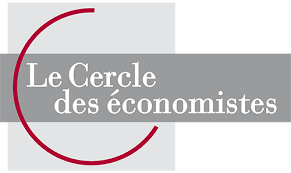PhD Day - June 9th

 Paper in a typewriter on which is written "New Research"
Paper in a typewriter on which is written "New Research"
This year, the Department is dedicating June 9th to our PhD students. Our first year students will have the opportunity to present their work for the first time to their peers and faculty members.
First time presentations can be daunting - come join us to warmly support our first year PhD Candidates !
- 9.30 -10.00 - Nicolas GHIO (Pierre Cahuc; Antoine Ferey, Arne Uhlendorff)
Public Policies for Long-Term Unemployed Workers - 10.05 -10.35 - Mattis Gilbert (Pierre Cahuc and Jean-Marc Robin; Clément de Chaisemartin, Roland Rathelot)
Information Frictions and Recruitement Practices - 10.40 - 11.10 - Johanna Roth (Pierre Cahuc; Ghazala Azmat, Roland Rathelot)
Essays on Unemployment, Job Search, and Policy Interventions
11.15 - 11.30 - Break
- 11.30 AM - 12 PM - Felipe Lauritzen (Julia Cagé; Golvine de Rochambeau, Claire Montialoux)
PHow Can Election Finance Enclose Representation Gaps and Drive Policy Change? An Econometric Analysis Using Novel Data from Brazil
12 - 1.30 PM - Lunch Buffet
- 1.30 - 2 PM - Olivia Tsoutsoplidi (Julia Cagé; Benjamin Marx, Emeric Henry)
Essays in Historical Political Economy
- 2.05 - 2.35 PM - Agathe Denis (Julia Cagé; Malka Guillot, xx)
Essays in Political Economics - 2.40 - 3.10 PM - Nicolas Schoch (Johannes Boehm; Nicolas Cœurdacier, Stefan Pollinger)
Commitment in Uncertain Times: Investment Decisions, Price Volatility, and the EU ETS
3.15 - 3.30 PM - Break
- 3.30 - 4 PM - Venance Riblier (Nicolas Cœurdacier; Paul Bouscasse, Stéphane Guibaud)
Essays on Sovereign Debt - 4.05 - 4.35 PM - Nathaniel Butler Blondel (Guillaume Plantin; Nicolas Cœurdacier, xx)
Essays in Macro-Finance and Financial Regulation
When ? THURSDAY, JUNE 9th, 2023 - 9.30 AM to 4.35 PM
Where ? Department of Economics - 4th floor - Salle J-P Fitoussi
Empirical IO Seminar - May 30th

 Vector gear infographic elements
Vector gear infographic elements

Shuang ZHANG is Associate Professor of Economics at Imperial College Business School. She joined Imperial College last year after teaching at the University of Colorado Boulder. She was a SIEPR Postdoctoral Fellow at Stanford University, after receiving her PhD in Economics from Cornell.
Her research interests are in environmental and energy economics, climate change, and gender inequality. She has received a number of grants, notably a J-PAL King Climate Action Initiative Research Grant, a National Science Foundation (NSF) Award, and a Columbia University ISERP Seed Grant. She was the recipient of the EPIC-UCAS Center for Energy Policy Research in China Research Award in 2019 (with Koichiro Ito).
Shuang ZHANG will present a paper, joint with Koichiro Ito, at the next Empirical IO Seminar on the theme:
More about Shuang ZHANG and her research
Date: TUESDAY, May 30th – 3:15 PM
Location: Department of Economics – 4th floor – Salle J-P Fitoussi
This is our last Empirical IO Seminar of the academic year 2022-23: we look forward to seeing you next Fall !
Friday Seminar - May 26th

 Paper in a typewriter on which it is written "New Research"
Paper in a typewriter on which it is written "New Research"

Jeanne COMMAULT is Assistant Professor of Economics at Sciences Po. Prior to joining the Department, she was a Max Weber Fellow at the European University Institute (EUI) and Research Associate at the University College London (UCL). This year she was on sabbatical leave at Princeton in the Fall, and during the Winter-Spring Semester, at the Einaudi Institute for Economics and Finance (EIFE), the Atlanta Fed and at the the Opportunity & Inclusive Growth Institute (OIGI) at the Minnesota Fed.
Her research lies in the fields of macroeconomics and applied microeconomics with a special focus on household consumption and saving behaviour. She received the Fondation Banque de France's prestigious PhD Dissertation Prize in 2018, the "Young Economist Award" by the European Economic Association and "Young Investigator Research Prize" by the International Association for Applied Econometrics in 2016.
Jeanne COMMAULT will present a paper at the next Friday Seminar on the theme:
More about Jeanne COMMAULT and her research
Date: FRIDAY, May 26th - 12:30 PM
Location: Department of Economics - 4th floor - Salle J-P Fitoussi
This is our last Friday Seminar of the academic year 2022-23: we look forward to seeing you again next Fall !
Banque de France Research Seminar - May 24th

 Banque de France and Sciences Po pediments on buildings
Banque de France and Sciences Po pediments on buildings
For our next Banque de France/Sciences Po Research Seminar "Banks and the Financial System: what regulation?" of the academic year, we are pleased to host Olivier JEANNE (Professor, Johns Hopkins University) on the theme:
Fiscal Inertia and Central Bank Backing of Government Debt
Jean DALBARD (French Treasury) will also give his views on the subject.
Banque de France / Sciences Po Research Seminars discuss issues on banking, financial systems and financial regulation. The objective is to confront the approaches and ideas of academics and practitioners.
If you would like to attend, please contact Stéphanie BERREBI by email.
Seminars are organised by Vivien Levy-Garboua (Affiliated & Associate Faculty member), Denis Beau (Sous-Gouverneur, Banque de France), Stéphane Guibaud (Professor at Sciences Po).
Date: Wednesday, May 24th - 5 PM
Location: Department of Economics - 4th floor - Room J-P Fitoussi
This is our final Banque de France Research Seminar of the year - we look forward to seeing you again next Fall !
Julia Cagé awarded the "Meilleure jeune économiste" Prize

 Julia Cagé, credit @Celine Bansard / Sciences Po
Julia Cagé, credit @Celine Bansard / Sciences Po

Inspired by the American Economic Association’s John Bates Clark Medal, Le Monde, French daily, and the Cercle des économistes, created the prize in 2000, to highlight the work of France’s best young economists and to make better known the multiple facets of economic science.
In awarding the 2023 Best Young Economist Prize to Julia Cagé ex aequo, with Vincent Pons (Harvard Business School), the jury has chosen to throw its projector on a particular research area in economics: works that analyse the current crisis in democracy. This area is firmly rooted in the concepts and methods of economics but also falls under the purview of political science – its current prevalence is related to growing concerns about the relationship between the economy and political power.
The list of concerns the Cercle des économistes evokes - the impact of the concentration of the media on the quality of information; the spread of disinformation on social networks; the funding of democracy and determinants of electoral participation - reads very much like a research statement that could be drafted by Julia Cagé!
Published in the leading journals, Julia Cagé’s work focuses on media economics, political participation and political attitudes.
In 2021 she was awarded an ERC Starting Grant for her 5-year project Campaign Finance, Information and Influence: A ComprehensIve Approach Using Individual-Level Data and Computer Science Tools (PARTICIPATE) which studies, notably, blindspots in the economic literature on the funding of political parties and the representativity of candidates for their electoral campaigns.
Her latest research projects, selected recently by McCourt Institute for substantial grants in 2022 and 2023, explore issues related to information in the digital age (the spread of disinformation on social media and online news) but also look at resolving them (how to slow down disinformation, how to ensure access to quality information).
Julia Cagé is also well-known to the general public for her books in which she proposes concrete, radical solutions after meticulously scrutinizing her topic. She has authored three books on the media, one of which - Saving the Media. Capitalism, Crowdfunding and Democracy (Paris, Le Seuil, 2015) - was awarded the Special Jury Prize for Best Book on Media of the 2016 edition of the “Prix des Assises du Journalisme”. Her latest critically acclaimed work « The Price of Democracy » (at Fayard in 2018, English edition at Harvard University Press, 2020) was awarded the Prix Pétrarque de l’essai by Le Monde and France Culture in 2019.
Proposing a solution to the problems she rigorously analyses using the economist’s toolbox, is a hallmark of Julia Cagé’s work. This aligns with the Best Young Economist Prize: the award showcases the ability of the laureate to trace a useful lead in answering the most pressing socioeconomic questions of the day.
With the awarding of the 2023 “Meilleure Jeune Economiste” Prize to Julia Cagé, the Department's permanent faculty members have been distinguished by the Cercle des économistes 12 times – seven faculty members are laureates of the prize (in 2020, Isabelle Mejean was the last to win it) and another five have been nominated for it.
Congratulations to Julia Cagé as well as to her co-laureate Vincent Pons!
Read more about Julia Cagé and her research
Read Le Monde interview with Julia Cagé and Vincent Pons, co-laureates (May 22nd, 2023, in French)
Read more about the Cercle des économistes: Prix du Meilleur Jeune Économiste
Julia Cagé is Associate Professor of Economics (with tenure) the Department of Economics and a Research Fellow at the Centre for Economic Policy Research (CEPR), where she also leads the Research and Policy Network on “Media Plurality”. She is co-director of the Laboratory for Interdisciplinary Evaluation of Public Policies (LIEPP)’s “Evaluation of Democracy” research group. She has published articles in journals such as the Review of Economic Studies, the American Economic Journal: Applied Economics, the American Economic Journal: Microeconomics, the Journal of International Economics, and the Journal of Public Economics.










